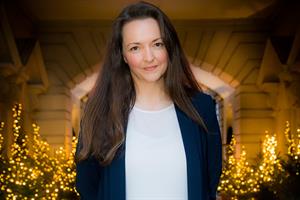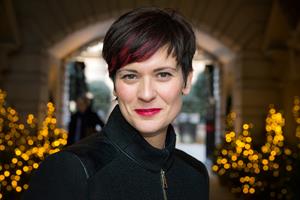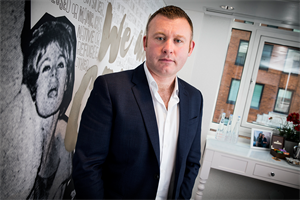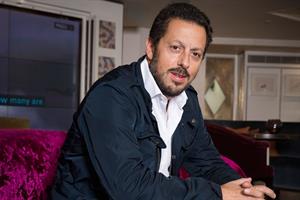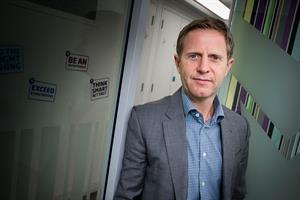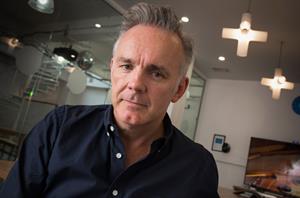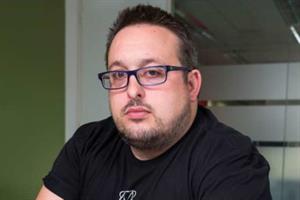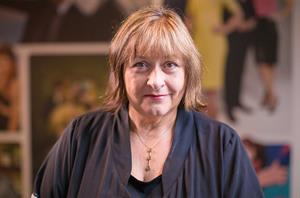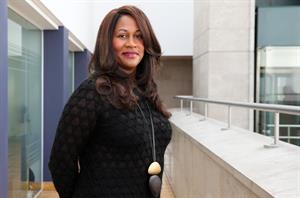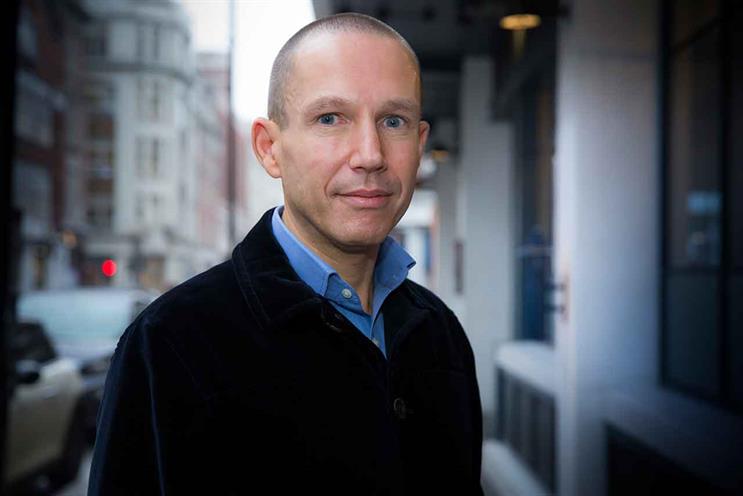
Who are the industry's biggest boundary pushers, the ones who have really made a difference? And who do they most admire? In association with The Trade Desk, we invite the biggest industry names to interview their boundary-pushing peers – and pass on the baton, in an interview relay.
In the previous instalment, Jenny Bullis chose Damian Blackden as her boundary pusher. Now she speaks to him, in the final instalment in the series…

How did you end up in media? Was it part of a grand plan?
I always vaguely wanted to go into advertising but didn’t really know how it all worked in reality, or how to go about getting a job. So I went to see a recruiter – to whom I was absolutely no use whatsoever because he wanted people with experience. After I bribed him with suitable amounts of alcohol he explained to me how it all worked – creatives, and account management, planners, media buyers. After I told him media sounded interesting he then photocopied the top 20 list of media independents from 北京赛车pk10 and told me to apply to them.
Zenith was at the top of the rank in those days, followed by TMD (now Carat). Both offered me a job. I took the one at Zenith because it was number one, it was affiliated with Saatchi’s, which I’d heard of, and also because the people at TMD kept going on and on about why I shouldn’t join Zenith – which only encouraged me.
You dived into digital very early on – was that a conscious decision?
I chose digital when it was in its infancy, but when I was quite a distance into my career. I had already spent eight years doing ‘usual’ media. It may seem very strange now, but success was by no means guaranteed, and several people enjoyed warning me of the risks I was taking. I also had to get used to the switch from spending £1m+ on media over a weekend, to deploying £20k over a month for the same clients, such as BMW and Lloyds TSB.
People were saying it was a risk, but what made you do it anyway? Do you gravitate towards technology?
Technology means change. I always look forward to changes, as they usually open up opportunities. I was also pulled towards it as clients such as BT and HP started talking to me about viral marketing, and we’d begun playing around with banners, whilst trying to work out how ad-servers worked. Fortunately, there were enough of us at the agency leaning into it all to make it work. We did a lot of experimenting with other people’s budgets but luckily more things went right than wrong!
You went from these big agency networks into what was essentially a start-up, Adnologies. That’s quite a leap…
Moving into technology was very different. People can have different subjective points of view about a media strategy and its effects, but tech either works at the performance it’s been designed to, or it doesn’t. The change gave me more empathy for clients; most are looking for certainty in these uncertain times. They want to be able to plan with a level of certainty, knowing whether they will get a return of tens or hundreds of thousands. Technology helps this.
I found it quite a big leap going client side to agency side, whereas you did agency to product side… It was a very big leap, dealing with very different types of people. Unsurprisingly there were many programmers, who weren’t all that commercially focused. I had to learn what motivated these new types of people, and quite quickly found out that it wasn’t financial. Coders in many ways are very creative, and the way they approach their craft is almost religious for some. This can make life complicated because they can prioritise based on what they believe in, and not always according to the commercial imperatives of the business or its clients. As in many instances, getting them to buy into the vision, but giving them some scope to operate in their own way, helped.
It was a very big leap, dealing with very different types of people. Unsurprisingly there were many programmers, who weren’t all that commercially focused. I had to learn what motivated these new types of people, and quite quickly found out that it wasn’t financial. Coders in many ways are very creative, and the way they approach their craft is almost religious for some. This can make life complicated because they can prioritise based on what they believe in, and not always according to the commercial imperatives of the business or its clients. As in many instances, getting them to buy into the vision, but giving them some scope to operate in their own way, helped.
What about that moment when you became a founder yourself – you went to being your own startup (Device9). Was that scary?
It was terrifying, but also quite liberating because you just go for it. You can have as much of a plan as you want, but until your software is produced and set loose in the market you don’t know how it’s going to be received.
You went into Maxus as worldwide chief strategy officer, which looks like a very traditional title. Clearly, in hiring you Maxus had no intention of having a traditional digital strategist. How much has your background contributed to you creating a new definition of a chief strategy officer?
Saying I created a new definition of a CSO is quite a bold statement! I wouldn’t claim to have done that, but you and I both know Maxus’ CEO Lindsay Pattison extremely well – and she is anything but traditional. What she wanted to do was really differentiate and future proof our agency network. Digital is a natural part of everything that we do. Technology and data inform our everyday decisions and actions. In fact, the same data’s increasingly informing both creative and media approaches, which I find rather compelling.
Do you find that, with your knowledge of digital technology, creatives are embracing your input into planning?
Most creative agencies want to get as far into the technology as they possibly can. It’s very rare for them to be resistant. And I think some of them are now looking back and reviewing some of the decisions they made. Rewind 15 or 20 years – if they’d got involved in the delivery and the serving of ads, they could've been the ones setting the technology agenda. But the media agencies ended up operating the tech that delivered and measured the ads, which has advanced our relevance no end.
So much has moved on in our industry. It’s a completely different space now but in the future, what will stay the same?
I think, despite all the information, despite all the technology and data, relationships still count. They’ll still count 100 years from now. Not only relationships between the brand and consumer, but also between the people working together inside our industry. Reputation will remain as important as it ever was. You can’t buy it and you can’t easily fake it.
Do you think the talent that we’re bringing into the industry – and all the new skills – is the same sort of talent that we were looking for 15 or 20 years ago?
I think people have to be much more versatile. It’s so much more complex and sophisticated. When I started out, the requirements were a bit of creativity, some science (not a great deal) and a lot of commercial acumen. Now, we look for a whole range of different skills – and the ability to be collaborative makes so much difference. It’s now not enough to be very good at what you do, you have to be brilliant to work with as well.
If we look at our industry leaders, from media owners to holding groups to agencies, they have been in industry for a very long time. Do you think they have they adjusted, or are we still waiting for the next generation?
We are all so much more accountable now, so those that are still here are the ones who have adjusted, although perhaps some a little more than others.
Alexa, Alexa Skills, Google Home, Siri - we are moving into a Connected home era - do you see marketing and media having a part to play? I think it’s essential. I think in having an approach for voice, sound and the way brands operate there is a pressing requirement. It’s unavoidable. Several years ago it was a challenge for a brand to move from the physical into an interactive form. Now brands have to occupy a place, a shape and form in someone’s mind, rather than just deliver it to someone’s eye on a screen. I have no doubt that somewhere someone is starting an agency that deals only in Google Home or other sound focused devices. I think we’ll see a focus on sonic brand signals – or in other words, maybe a return to the jingle.
I think it’s essential. I think in having an approach for voice, sound and the way brands operate there is a pressing requirement. It’s unavoidable. Several years ago it was a challenge for a brand to move from the physical into an interactive form. Now brands have to occupy a place, a shape and form in someone’s mind, rather than just deliver it to someone’s eye on a screen. I have no doubt that somewhere someone is starting an agency that deals only in Google Home or other sound focused devices. I think we’ll see a focus on sonic brand signals – or in other words, maybe a return to the jingle.
So the mnemonic is going to come back then. Do brands now need to worry about what their brand ‘sounds like’? Perhaps this will be the rebirth of radio?
The tone of voice is going to become so important. I think we have reached ‘peak screen’ – a concept which is both exciting and terrifying. There’s so much opportunity for brands. Amazon’s now able to dramatically reduce the friction between brand awareness and purchase, for example.
Google has a different kind of challenge and opportunity. It needs to work out how it’s going to place the ads. Pre-roll sound ads won’t do. Google knows this and given that they play the long game very well, whatever they come up with should be very interesting.
Are you a user of these connected services?
I’m waiting for Google Home to come to the UK. I also want a pair of Doppler earphones, which are just about to ship. They’re going to be the first sort of augmented reality earphones, in the way they shape sound, and adapt according to the environment one’s in.
Many agencies have challenged the siloed definition of digital, doing away with the ‘head of digital’ and digital planner roles. With digital becoming more complicated by the day due to programmatic and analytics, do you see the re-emergence of the digital specialist as inevitable? Or do you think we should up skill planners and marketers?
That’s a really interesting question. I sometimes think those who operate under the name ‘head of digital’ are potentially living dangerously because everything is digital! That said, it is so complex and moving so fast that very specialist services and expertise are certainly required. If we think of it rather like the medical industry – you have generalists, but you also need specialist surgeons, and technical experts to do certain jobs. Successful businesses should probably take the same approach.
Who inspires you? And what motivates you on a difficult day?
I don’t tend to have those days. But any time I’m about to go into a difficult meeting or if something isn’t happening the way I want, I remind myself of when I was running my own business. Often there were large and immediate problems to solve – for example, when the software isn’t operating as it should on Christmas Eve for several advertisers, because one large client had badly underestimated how many server calls they’d be making. Remembering challenges like that usually helps me get a sense of perspective.
It’s getting things done that motivates me. I travel a lot for work, and I love heading off somewhere at short notice. I usually know what the mission is, but I don’t get the full picture until I get there and work with the teams. Then I enjoy working out the exact challenge and how to solve it, usually by systematically dismantling it, and then working with our people on building something clear, relevant and hopefully compelling to our clients. Then I fly back home and enjoy a glass of wine on the plane.

How would you describe your style of leadership? And what’s the best career advice you’ve ever been given?
Intuitive, purposeful and personal. Personal relationships remain so important, and I think many highly motivated people invest in their work personally, especially as the delineation between business and everything else continues.
As mentioned, you can’t buy or fake reputation, which means it’s just as important to be a great person to work with as it is to be as good as you can be at the job.
What’s the biggest lesson you have learned in recent years?
I learned at Zenith to put my bookings on the system in time every week, in order to avoid being fired, which I nearly was in the first month for forgetting. I didn’t forget again. And I guess I’ve learned that one doesn’t tend to go too far wrong by assuming positive intentions unless proven otherwise, and that being straight, normal and truthful tends to make life a whole lot simpler.
What’s going to be the next big thing in programmatic? I think the next thing in programmatic is that context is going to see a revival. Audience-based serving is fantastic, as you know. Programmatic was the seismic change in our industry, not the digitisation of content, which we all thought was the big shift 15 years ago. Placing the same ad in Vogue and Woman’s Weekly is not the same thing, even if it’s exactly the same person reading it. Context matters. And I think it’s been overlooked and de-prioritised in favour of audience-based approaches. I feel more contextual filters will increasingly be applied to campaigns, especially as more and more brand focused clients move up the programmatic agenda.
I think the next thing in programmatic is that context is going to see a revival. Audience-based serving is fantastic, as you know. Programmatic was the seismic change in our industry, not the digitisation of content, which we all thought was the big shift 15 years ago. Placing the same ad in Vogue and Woman’s Weekly is not the same thing, even if it’s exactly the same person reading it. Context matters. And I think it’s been overlooked and de-prioritised in favour of audience-based approaches. I feel more contextual filters will increasingly be applied to campaigns, especially as more and more brand focused clients move up the programmatic agenda.
Will what came up in the news – with the "big brands fund terror" headline – change anything, or do you think it’s one of those issues that just flares up and dies down again?
It’s an enduring priority. All parties are collectively responsible for ensuring that brands appear in a pollution free context. Several of the technology and social platforms that have inadvertently helped ads appear in unsuitable environments have previously hidden behind words such as ‘neutrality’ and ‘open’. That will not do, and it’s refreshing to see them taking on some of the responsibility agencies and brands have been dealing with themselves until now.
About The Trade Desk
Recently named seventh on the Deloitte Technology Fast 500, ninth in Forbes Magazine's Top 100 List of America's Most Promising Companies and #34 on the Inc. 500, powers highly sophisticated buyers in advertising technology.
Founded by pioneers of real-time bidding, has become one of the fastest growing demand-side platforms in the industry offering agencies, aggregators and their advertisers leading-edge technology to manage omni-channel advertising campaigns.


